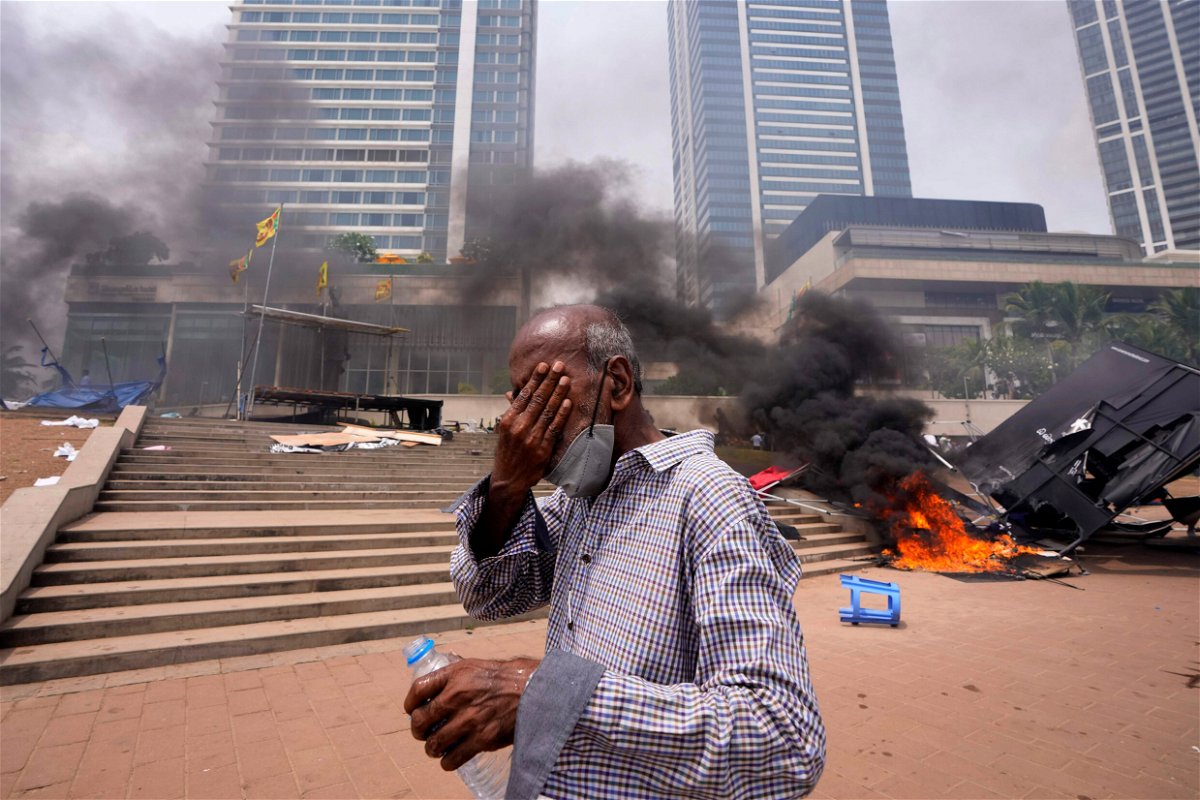Military rescues Sri Lanka’s Prime Minister in pre-dawn operation as violent clashes leave eight dead

The Military rescues Sri Lanka's Prime Minister in a pre-dawn operation as violent clashes leave seven dead. A man is seen protecting his eyes from tear gas as he passes the site of anti-government protests in Colombo
By Iqbal Athas, Hannah Ritchie and Rhea Mogul, CNN
Sri Lanka’s outgoing Prime Minister Mahinda Rajapaksa was rescued in a pre-dawn military operation Tuesday, hours after his resignation, as violent clashes between pro and anti-government protesters left several people dead and hundreds injured.
The military were called to the Prime Minister’s ‘Temple Trees’ compound after protesters tried to breach his private residence twice overnight, a senior security source told CNN.
The attackers managed to “enter the outer perimeter” of the residence where they hurled petrol bombs, but their attempts to enter the building were thwarted when the military fired tear gas, according to the source.
One police officer involved in the clashes died at the scene when a tear gas gun exploded, the security official said, confirming that 76-year-old Prime Minister Rajapaksa and his family have since been taken to an undisclosed location.
Troops have also been ordered to shoot anyone found to be damaging state property or assaulting officials, the Ministry of Defense said, in a statement following an attack on the Senior Deputy Inspector General of Police.
The scenes came after an evening of violent clashes across Sri Lanka’s capital Colombo on Monday, during which at least eight people died according to police, although it is unclear if all of the deaths were directly related to the protests.
Some 217 people were also injured as a result of the clashes, local health authorities reported.
Prime Minister Rajapaksa quit on Monday evening shortly after a nationwide curfew was imposed. The curfew came after live television showed footage of government supporters, armed with sticks, beating protesters at several locations across the capital, including at Galle Face Green park, and tearing down and burning their tents. Dozens of homes were torched across the country amid the violence, according to witnesses CNN spoke to.
The park has become a focal point for protesters who have been demonstrating for weeks against the government’s alleged mishandling of an economic crisis that has caused prices of everyday goods to soar and widespread electricity shortages.
Armed troops were deployed, according to CNN’s team on the ground, while video footage showed police firing tear gas and water cannons to disperse the protesters.
“We are helpless now, we are begging for help,” Pasindu Senanayaka, an anti-government protestor told Reuters, as black smoke spiraled out of a burning tent nearby and parts of the protest camp lay in disarray.
Police have accused the protesters of violence too, saying they attacked buses carrying local officials to Colombo for a meeting with the Prime Minister.
Following the chaotic scenes, the government brought in an island-wide curfew, and soon afterwards the Prime Minister, resigned. “Multiple stakeholders have indicated the best solution to the present crisis is the formation of an interim all-party government,” he said.
“Therefore, I have tendered my resignation so the next steps can be taken in accordance with the Constitution.”
However, it remains unclear if the curfew and his resignation will be enough to keep a lid on the increasingly volatile situation in the country of 22 million.
Many protesters say their ultimate aim is to force President Gotabaya Rajapaksa — the Prime Minister’s brother — to step down, something he has so far shown no sign of doing.
The President has condemned the violence in a post on Twitter, but has stopped short of apportioning blame.
“(I) strongly condemn the violent acts taking place by those inciting and participating, irrespective of political allegiances,” he wrote. “Violence won’t solve the current problems.”
He also urged citizens to “remain calm & stop violence & acts of revenge against citizens, irrespective of political affiliations.”
“All efforts will be made to restore political stability through consensus, within constitutional mandate & to resolve economic crisis,” President Rajapaksa tweeted.
On Tuesday, Human Rights Watch said the use of violence by government supporters had sparked “a dangerous escalation, increasing the risk of further deadly violence and other abuses.”
Meenakshi Ganguly, South Asia director at Human Rights Watch, urged the government to “uphold the right to peaceful protest.”
“It is vitally important for the security forces to fully respect the right to peaceful assembly, and for those responsible for violence to be held to account,” Ganguly said.
The European Union (EU) said it “condemns the recent vicious attacks against peaceful protesters in Colombo” and “deplores the loss of life,” according to a statement on Tuesday.
The bloc also asked authorities to investigate the events in Sri Lanka to “hold accountable those instigating or perpetrating violence.”
For weeks, Sri Lanka has been battling its worst economic crisis since the island nation gained independence in 1948, leaving food, fuel, gas and medicine in short supply, and sending the cost of basic goods skyrocketing.
Shops in the country have been forced to close because they can’t run fridges, air conditioners or fans, and soldiers have been stationed at gas stations to calm customers, who must line up for hours in the searing heat to fill their tanks. Some people have died waiting.
Protesters in Colombo first took to the streets in late March, demanding government action and accountability. The government was recently thrown into disarray when ministers stepped down en masse.
Last Friday, President Rajapaksa declared a state of emergency following skirmishes near the country’s parliament, but public anger continues to escalate.
The Rajapaksa family has dominated Sri Lankan politics for over two decades. Prime Minister Mahinda Rajapaksa’s resignation comes as several other family members who previously held cabinet level positions have also been forced to step down.
President Rajapaksa is the only remaining family member still in power.
The-CNN-Wire
™ & © 2022 Cable News Network, Inc., a WarnerMedia Company. All rights reserved.